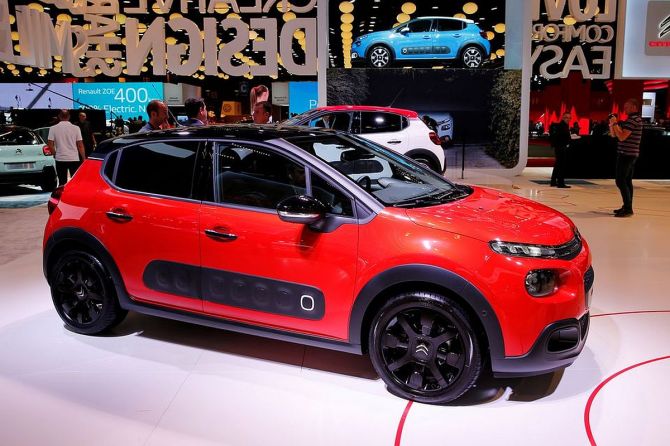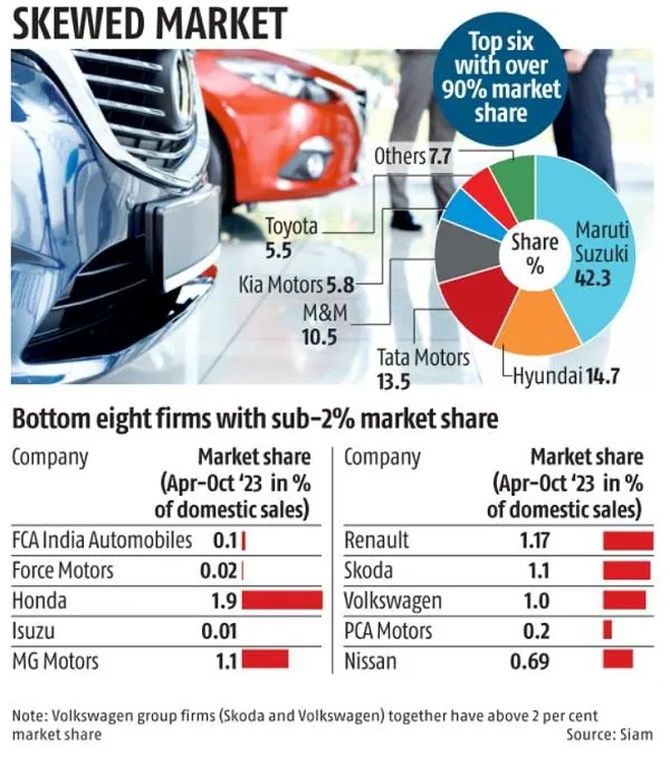
Of the 15 car manufacturing companies in India, eight have a market share of below 2 per cent, raising questions about their long-term future in a competitive market that has already seen Ford Motors and General Motors slam the door on India.
The eight are Honda, Nissan, Renault, MG Motors, Volkswagen, and Skoda brands (calculated separately), Isuzu, FCA India (which sells the Jeep), and PCA Motors, the Indian unit of Stellantis that launched the Citroen C5 Aircross.
The growing consolidation in the market is reflected in the fact that the top four — Maruti Suzuki, Tata, Hyundai, and M&M — account for 81 per cent of the total market between April and October 2023. If the other two — Kia and Toyota — are added, the number crosses over 92 per cent.
As to the eight companies at the bottom of the list, their collective market share is only 5.19 per cent for the same period.
Though from the same group, the figures for Volkswagen (a 1 per cent share) and Skoda (1.1 per cent) collectively manage to be just over 2 per cent.
Automotive industry expert and former Hyundai India president B V R Subbu said more companies would follow Ford and General Motors.
“I don’t think, based on the strengths of the players, that there will be more than seven or eight players in India in the next three to four years,” said Subbu.
His prognosis could include new players in the game, such as Tesla and Ola Electric.
How the ambitious dreams of some of these companies have faltered can be seen from their earlier announcements and today’s reality.
In 2009, Volkswagen, the number one car maker in the world, announced it was aiming at an 8 to 10 per cent share of the domestic market.
Earlier this year, Piyush Arora, managing director Skoda, Volkswagen India, told the media that the company was looking at heading for only a 5 per cent market share in 2025.
In 2010, Honda said it would be looking for a 10 per cent market share in India that year.
In 2018, the then managing director of Honda in India, Yoichiro Ueno, reiterated the same target.
During the April-October 2023 period, Honda’s share is a mere 1.9 per cent.
Putting a brave face on it, Takuya Tsumuru, president and CEO of Honda in India, said the company was not looking to exit because it was here for the long term.
Nissan India also had a clear plan for India. Its operations president, Guillaume Sicard, told the media that it wanted to hit a 5 per cent market share by 2020.
Its current market share for April-October 2023 is 0.69 per cent with only 17,223 vehicles sold.
Like Honda, it has said it will remain invested in India in collaboration with Renault and will put in $600 million in FY24.
Meanwhile, Renault has sold 1 million vehicles to date and wants to double this by 2030 even though it sold only 28,868 vehicles in April-October.
Many carmakers faced with the failure of their earlier targets for market share have shifted strategy by focusing on exports from India.
One example is Volkswagen (excluding Skoda) whose domestic sales and exports are almost 50-50 (around 25,000).
In April-October, the Volkswagen group accounted for a reasonable 6.5 per cent of all car exports from the country.
Nissan and Renault also sell much more in the export market than they do in India.
The two exported 34,224 vehicles in April-September, accounting for 8.7 per cent of total exports.
In the same period, their collective share of the domestic market was only 1.85 per cent.
Feature Presentation: Rajesh Alva/Rediff.com
Source: Read Full Article

